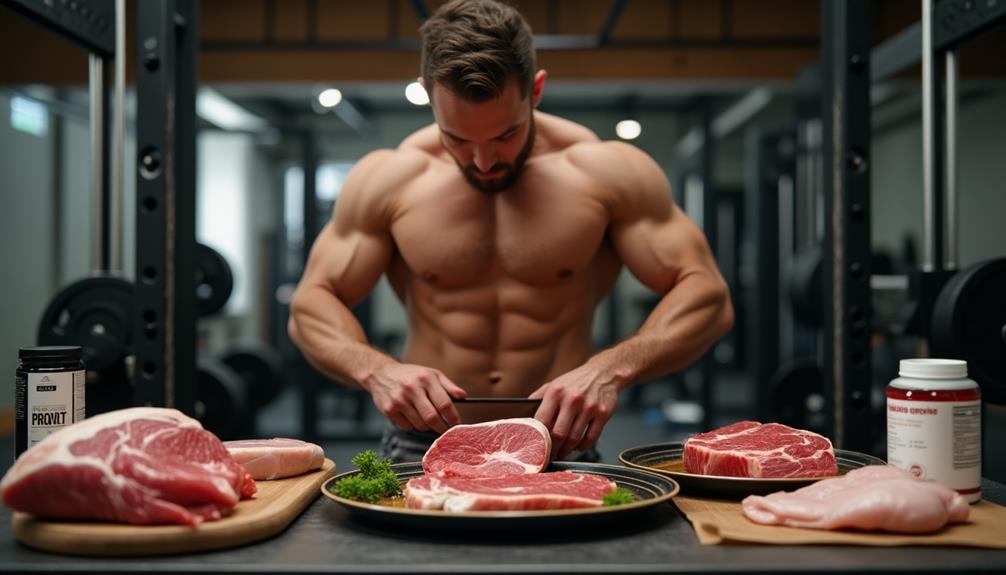The carnivore diet focuses solely on animal products, making it ideal for muscle gain. It's rich in protein and healthy fats, which support muscle repair and growth. You'll want to include foods like steak, eggs, and organ meats for essential nutrients. Pre- and post-workout meals are vital; consider steak or beef jerky for energy and recovery. Stay hydrated and balance your electrolytes with bone broth. Aim for multiple meals each day, listening to your hunger cues while avoiding excessive fasting. If you're keen to optimize your gains, there's plenty more to discover about meal plans and tips to enhance your journey.
Core Insights
- Focus on high-protein animal products like beef, chicken, and eggs to support muscle repair and growth.
- Incorporate healthy fats from fatty cuts of meat for energy and hormone production essential for muscle gain.
- Include organ meats like liver for vital vitamins and minerals that aid in overall health and muscle function.
- Prioritize post-workout nutrition with protein-rich foods like beef jerky or bone broth to enhance recovery.
- Stay hydrated and maintain electrolyte balance with mineral-rich water and bone broth to support muscle function.
Understanding the Carnivore Diet
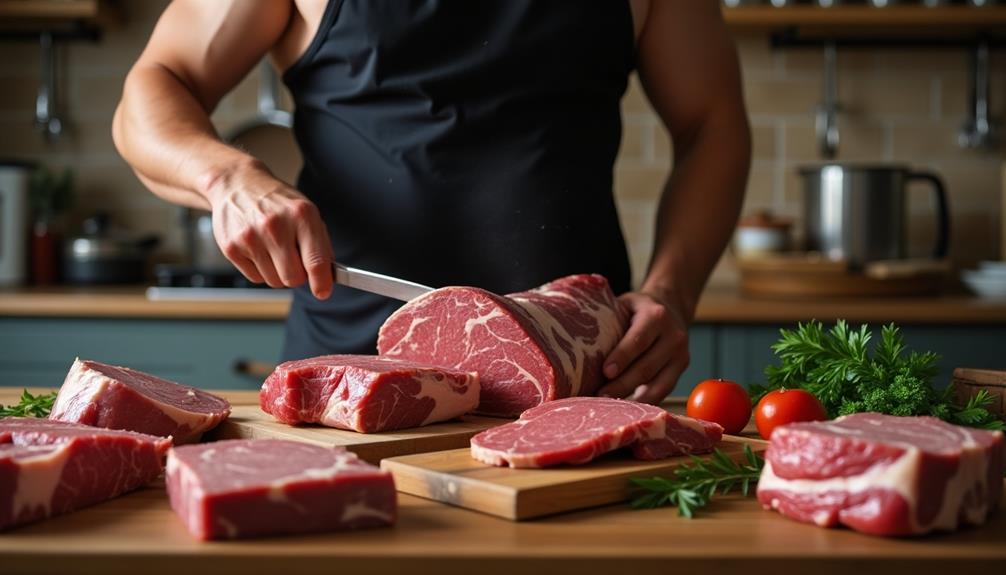
The carnivore diet, often seen as an extreme method, primarily comprises animal products such as meat, fish, and dairy while excluding all plant-based foods. As you delve into this diet, you'll observe its simplicity. You concentrate on consuming whole, unprocessed animal products, which are believed to offer vital nutrients. This approach contrasts greatly with plant-based diets that depend on non-animal protein sources like pea protein powder.
This diet removes carbohydrates and highlights protein and fat as primary energy sources. You might discover that it promotes a high intake of red meat, poultry, eggs, and some dairy.
While many supporters praise increased satiety and enhanced energy levels, it is crucial to take into account potential nutritional deficiencies. Grasping the carnivore diet's basics will aid you in assessing its appropriateness for your lifestyle and fitness goals.
Benefits for Muscle Gain
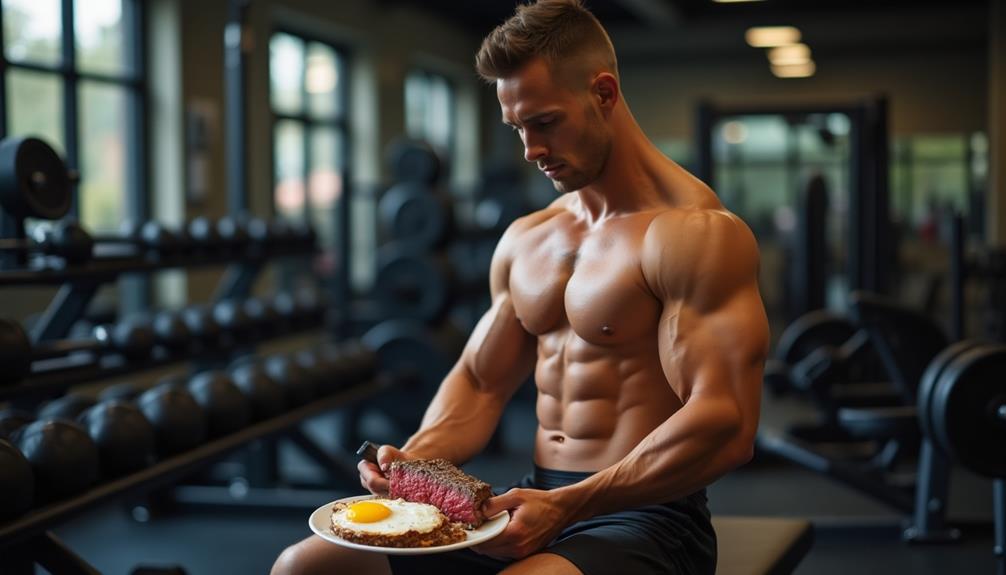
When considering muscle gain, the carnivore diet offers several unique benefits that can greatly enhance your results. First, this diet is high in protein, which is essential for muscle repair and growth. Protein-rich foods like beef, chicken, and fish provide amino acids that help your muscles recover after workouts. While whole food sources are ideal, some individuals may benefit from casein protein supplements to support their muscle-building goals, especially for slow-release protein during sleep.
Second, the carnivore diet is low in carbohydrates, which can aid in fat loss, allowing your muscles to appear more defined. This combination of high protein and low carbs can lead to better muscle density.
Essential Nutrients to Consider
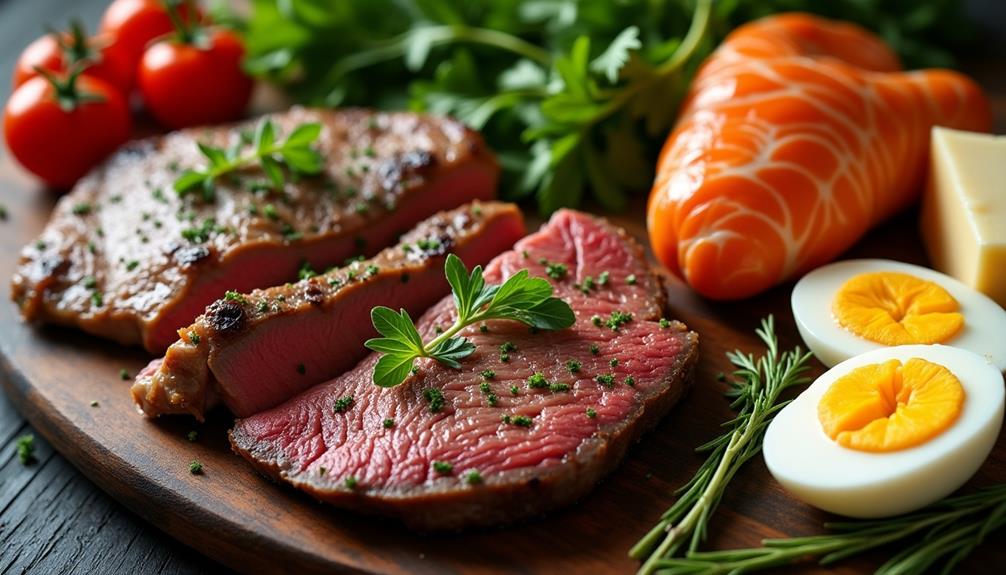
To maximize your muscle gain on the carnivore diet, it's essential to pay attention to necessary nutrients that support your overall health and performance.
Protein is important, as it helps repair and build muscle tissue. Focus on high-quality sources like beef, pork, and poultry. For best muscle recovery, consider incorporating slow-digesting protein sources, such as casein protein powder, before bedtime to support overnight muscle feeding.
Fats are also essential for energy and hormone production. Include fatty cuts of meat and animal fats for best results.
Don't overlook vitamins and minerals. Nutrient-dense organ meats, like liver, provide necessary vitamins A, B12, and iron.
Omega-3 fatty acids, found in fatty fish, support muscle recovery and reduce inflammation.
Sample Meal Plans
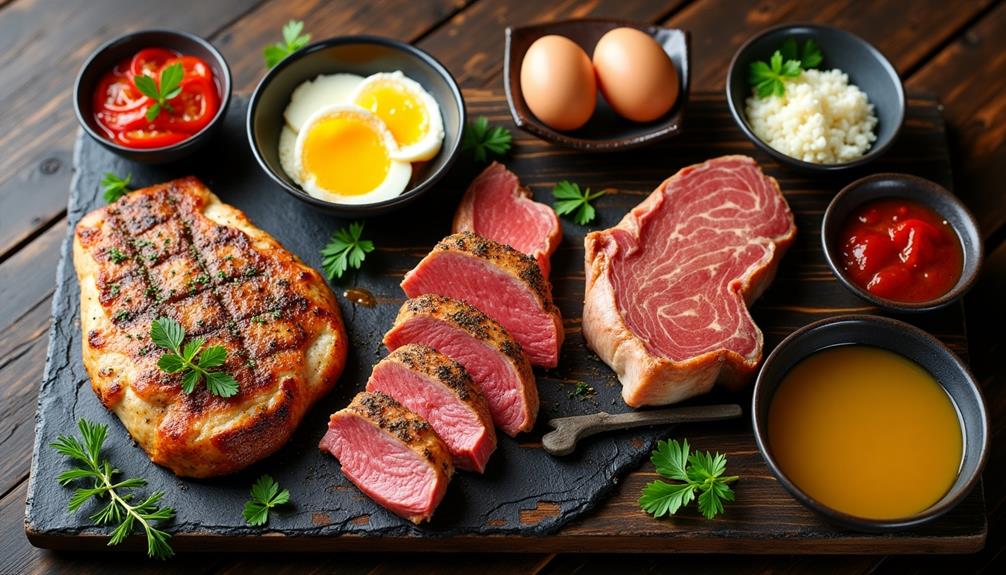
Creating a meal plan can seem overwhelming, but with the carnivore diet, it's straightforward. Here's a sample meal plan to kickstart your muscle gain journey:
- Breakfast: 3 scrambled eggs cooked in beef tallow, served with a side of bacon.
- Lunch: Grilled ribeye steak paired with bone marrow for added flavor and nutrients.
- Snack: Beef jerky or pork rinds to keep your energy levels up between meals.
- Dinner: Slow-cooked lamb shanks with a side of organ meats like liver for essential vitamins.
Feel free to adjust portion sizes based on your caloric needs. Sticking to this plan can help you meet your protein requirements while keeping your meals simple and satisfying. Enjoy the journey!
Pre- and Post-Workout Nutrition
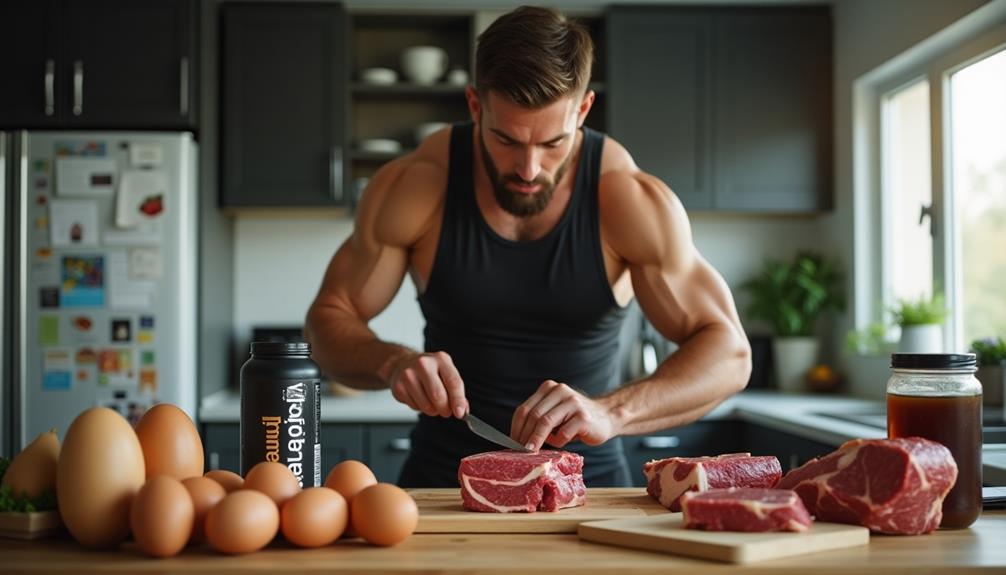
Adequate pre- and post-workout nutrition is essential for maximizing your muscle gains on the carnivore diet. Before your workout, focus on consuming protein-rich foods to fuel your muscles. Options like steak or eggs can provide the necessary amino acids. After your workout, prioritize recovery by having more protein to repair muscle fibers.
Here's a simple table to guide you:
| Meal Timing | Food Options | Benefits |
|---|---|---|
| Pre-Workout | Steak, Eggs | Provides energy, amino acids |
| Post-Workout | Beef Jerky, Bone Broth | Aids recovery, hydration |
| Throughout Workout | Water, Electrolytes | Maintains hydration |
Tips for Transitioning

Shifting to a carnivore diet can be a game-changer for your muscle gain goals, but it requires some thoughtful adjustments. Here are some tips to help you smoothly transition:
- Start Gradually: Begin by removing non-meat foods one at a time, allowing your body to adjust.
- Hydrate: Drink ample water to stay hydrated and support digestion during this shift.
- Listen to Your Body: Pay attention to how you feel. If you're experiencing fatigue or discomfort, reassess your food choices.
- Plan Your Meals: Create a meal plan that highlights variety in meats to guarantee you get all necessary nutrients.
Common Mistakes to Avoid

Avoiding common pitfalls can make a significant difference in your success on the carnivore diet for muscle gain. Here are some mistakes you should steer clear of:
| Mistake | Description | Solution |
|---|---|---|
| Ignoring Nutrient Variety | Sticking to just one type of meat | Incorporate different cuts of meat |
| Neglecting Hydration | Focusing solely on food intake | Drink plenty of water |
| Skipping Meals | Not eating enough to fuel workouts | Schedule regular meals |
| Overlooking Recovery | Forgetting to rest after workouts | Prioritize sleep |
| Lack of Meal Planning | Eating on impulse | Plan meals ahead of time |
Supplementation Recommendations

To maximize your muscle gains on the carnivore diet, include specific supplements that can enhance your performance and recovery. These supplements can help fill in nutritional gaps and support your training regimen. Here are four recommendations to incorporate:
- Creatine: This can enhance your strength and muscle mass by increasing ATP production, which fuels your workouts.
- Omega-3 Fatty Acids: Helpful for reducing inflammation and supporting joint health, especially if you're primarily consuming animal products.
- Electrolytes: Vital for hydration and muscle function, especially when following a low-carb diet.
- Vitamin D: Promotes overall health and muscle function; contemplate a supplement if you're not getting enough sunlight.
Including these supplements can complement your carnivore diet and support your muscle gain goals effectively.
Tracking Your Progress

Tracking your progress on the carnivore diet is essential for ensuring you're meeting your muscle gain goals. Regularly monitoring key factors can help you make necessary adjustments. Here's a simple table to help you keep track:
| Date | Weight (lbs) | Muscle Measurements (inches) |
|---|---|---|
| Week 1 | 180 | Chest: 40, Arms: 14 |
| Week 4 | 182 | Chest: 41, Arms: 14.5 |
| Week 8 | 185 | Chest: 42, Arms: 15 |
Tailoring Your Plan to Goals
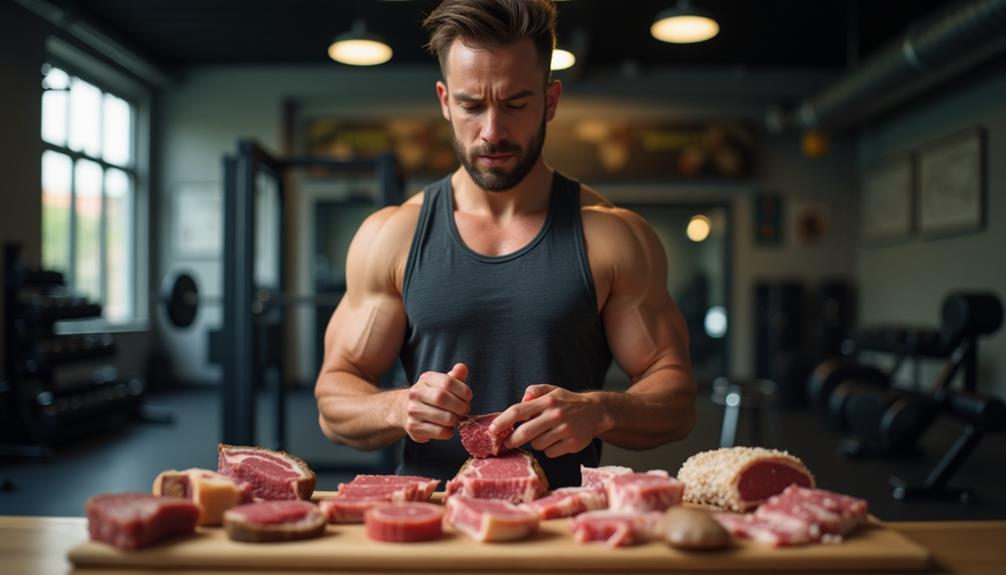
When it comes to muscle gain on the carnivore diet, customizing your approach is essential for achieving your specific fitness goals. Start by identifying what you want to accomplish. Here are four key factors to keep in mind:
- Caloric Intake: Make sure you're consuming enough calories to support muscle growth.
- Protein Sources: Choose high-quality protein options, like beef and organ meats, for best muscle repair.
- Meal Timing: Take into account when you eat to maximize energy levels and recovery post-workout.
- Supplementation: Think about adding electrolytes or collagen to support overall health and recovery.
Frequently Asked Questions
Can I Combine the Carnivore Diet With Other Diets?
Yes, you can combine the carnivore diet with other diets, but monitoring how your body responds is crucial. Experimenting with variations could help you find the best approach for your health and fitness goals.
Is the Carnivore Diet Safe Long-Term?
Is the carnivore diet safe long-term? That's a question many ask. While some thrive, others face risks. You should monitor your health closely, consulting professionals to guarantee it suits your body's needs and goals.
How Does the Carnivore Diet Affect Digestion?
The carnivore diet greatly alters digestion. You might experience fewer digestive issues initially, but some individuals report constipation or discomfort due to the absence of fiber. Monitoring your body's response closely is crucial.
Can I Drink Alcohol on the Carnivore Diet?
Imagine a lion savoring its kill, but then sipping on sweet nectar—alcohol disrupts your body's primal instincts. You can occasionally indulge, but it might hinder your progress and recovery on the carnivore diet.
What Are the Best Meats for Muscle Gain?
When focusing on muscle gain, you should prioritize lean meats like chicken and turkey, as well as nutrient-rich options like beef and pork. Don't forget fish and organ meats for added vitamins and minerals!

